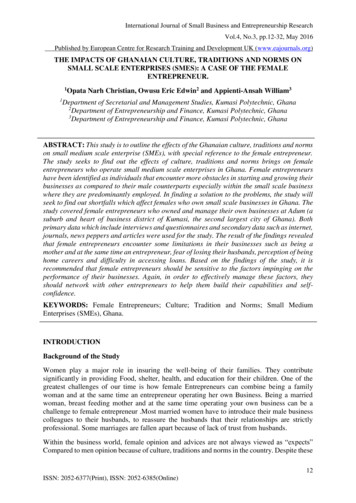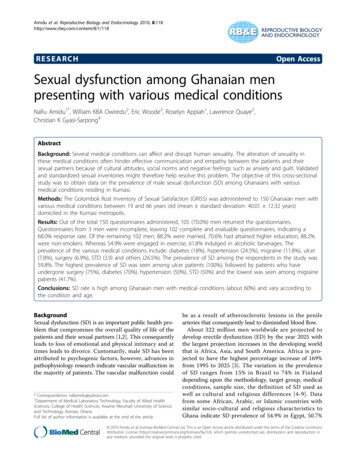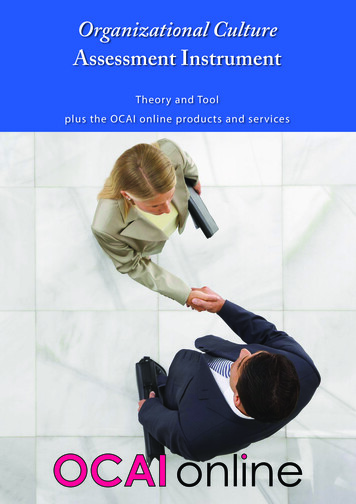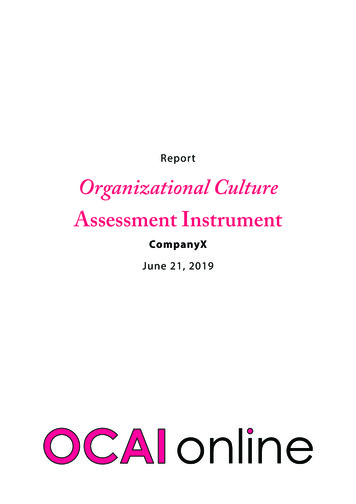
Transcription
International Journal of Small Business and Entrepreneurship ResearchVol.4, No.3, pp.12-32, May 2016Published by European Centre for Research Training and Development UK (www.eajournals.org)THE IMPACTS OF GHANAIAN CULTURE, TRADITIONS AND NORMS ONSMALL SCALE ENTERPRISES (SMES): A CASE OF THE FEMALEENTREPRENEUR.1Opata1Narh Christian, Owusu Eric Edwin2 and Appienti-Ansah William3Department of Secretarial and Management Studies, Kumasi Polytechnic, Ghana2Department of Entrepreneurship and Finance, Kumasi Polytechnic, Ghana3Department of Entrepreneurship and Finance, Kumasi Polytechnic, GhanaABSTRACT: This study is to outline the effects of the Ghanaian culture, traditions and normson small medium scale enterprise (SMEs), with special reference to the female entrepreneur.The study seeks to find out the effects of culture, traditions and norms brings on femaleentrepreneurs who operate small medium scale enterprises in Ghana. Female entrepreneurshave been identified as individuals that encounter more obstacles in starting and growing theirbusinesses as compared to their male counterparts especially within the small scale businesswhere they are predominantly employed. In finding a solution to the problems, the study willseek to find out shortfalls which affect females who own small scale businesses in Ghana. Thestudy covered female entrepreneurs who owned and manage their own businesses at Adum (asuburb and heart of business district of Kumasi, the second largest city of Ghana). Bothprimary data which include interviews and questionnaires and secondary data such as internet,journals, news peppers and articles were used for the study. The result of the findings revealedthat female entrepreneurs encounter some limitations in their businesses such as being amother and at the same time an entrepreneur, fear of losing their husbands, perception of beinghome careers and difficulty in accessing loans. Based on the findings of the study, it isrecommended that female entrepreneurs should be sensitive to the factors impinging on theperformance of their businesses. Again, in order to effectively manage these factors, theyshould network with other entrepreneurs to help them build their capabilities and selfconfidence.KEYWORDS: Female Entrepreneurs; Culture; Tradition and Norms; Small MediumEnterprises (SMEs), Ghana.INTRODUCTIONBackground of the StudyWomen play a major role in insuring the well-being of their families. They contributesignificantly in providing Food, shelter, health, and education for their children. One of thegreatest challenges of our time is how female Entrepreneurs can combine being a familywoman and at the same time an entrepreneur operating her own Business. Being a marriedwoman, breast feeding mother and at the same time operating your own business can be achallenge to female entrepreneur .Most married women have to introduce their male businesscolleagues to their husbands, to reassure the husbands that their relationships are strictlyprofessional. Some marriages are fallen apart because of lack of trust from husbands.Within the business world, female opinion and advices are not always viewed as “expects”Compared to men opinion because of culture, traditions and norms in the country. Despite these12ISSN: 2052-6377(Print), ISSN: 2052-6385(Online)
International Journal of Small Business and Entrepreneurship ResearchVol.4, No.3, pp.12-32, May 2016Published by European Centre for Research Training and Development UK (www.eajournals.org)Challenges encountered by female entrepreneurs, about 71%of female are engaged in selfemployment both agriculture andnon-agriculture as compared to 67.5% of their malecounterparts while more males 23% are in the wage employment than females 6.2% accordingto the survey by the Ghana statistical services (G.L.S.S 4, 2000).Even though more females are into self-employment than males in Ghana, inadequate support,culture, traditions and norms of the country tend to have negative impacts on the femaleentrepreneurs (G.L.S.S 4, 2000). Since entrepreneurs contributes up to 78 % of employmentand more than 29 % of GDP in Developing an economy (Salat, 2012), a decline in theproductivity of these female entrepreneurs will have negative effects on the balance ofpayments and other macroeconomic indicators example employment. It is therefore prudent toassess the impacts of the above aforementioned factors on female entrepreneurs in particularand the nation in general.Problem StatementThe activities of women entrepreneurs have significant positive impact on the economy.Among these impacts, women entrepreneurs face conflicts of work and home roles. The mainconflicts in work role pertained to inability to spend time with their families and being a goodspouse which can lead to failure in their businesses and also complying with being anentrepreneur and a married woman can be a significant burden which can bring povertyandinsecurity that can lead to extremism, which threatens the safety of everyone. In additionto the problems above, they can also encounter stress which can cause a problem to their health.Research AimThe aim of the study is to find out the impacts culture, traditions and norms have on femaleentrepreneurs. The following specific objectives have to achieved: To access the extent to which culture, tradition and norms affects female entrepreneursthan their male counterparts.To determine the negative impacts it brings on the economy.To determine whether culture, traditions and norms affect business.Research QuestionsTo achieve the objective of the study, the following research questions have been tested: What are the effects of culture, tradition and norms on female entrepreneurs?What is the relationship between culture, traditions and norms and entrepreneurship?What challenges can it brings on the nation?Scope of the StudyThe scope of this study was to carry out a comprehensive research into the Ghanaian Culture,traditions and norms and its impacts on the SMEs operators with special reference to femaleentrepreneurs. Since the whole of the SMEs in Ghana could not be studied, the study waslimited to female entrepreneurs at Adum which is the business district of Kumasi Metropolis.13ISSN: 2052-6377(Print), ISSN: 2052-6385(Online)
International Journal of Small Business and Entrepreneurship ResearchVol.4, No.3, pp.12-32, May 2016Published by European Centre for Research Training and Development UK (www.eajournals.org)LITTERATEUR REVIEWGender and the Entrepreneurial Career ChoiceAccording to Gartner (1990; 2004), an entrepreneur is one who undertakes a commercialenterprise and who is an organisational creator and innovator. Theoretically entrepreneurincludes elements of smallness, competition, deregulation, innovation and risk (Verheul &Thurik, 2000). Considering these features an entrepreneur historically assumed to be male(Green and Cohen 1995, p.299; Beggs et al.1994). However, Winn, (2005) stated thatentrepreneur is the one who prospects for or exploits opportunities and who has a tenacity toface challenges. Krueger and Brazeal (1994) described entrepreneurship as gender neutral whoperceives themselves as pursuing opportunities irrespective of existing resources. Again,Buttner and Moore's (1997) were of the view that entrepreneurship is a gender-blind careerchoice. Although this assertion is theoretically true, in practice gender and environment acttogether to confirm the success or failure of women as entrepreneurs. Findings fromresearchers including Buttner and Moore 1997; Mattis2004; Woldie and Adersua 2004)revealed that women entrepreneurs differ from men in terms of their motivations, the types ofexternal barriers that they face, and the type of help available to women.Research shows that a variety of intrinsic and extrinsic factors that might influence women tochoose an entrepreneurial career. Intrinsic factors include the person's personality or traits suchas having a proactive, assertive personality, being self-governed and positive (Akrivos et al.,2007, Mordi, et, al., 2010). In this respect, female entrepreneurs have been found to be lessoriented to financial reward than men (Rosa et al, 1996), valuing work satisfaction andchallenge, and to hold 'androgynous' or masculine self perceptions (Brodsky, 1993) such asconfidence, a sense of adventure and risk taking. Extrinsic factors include family circumstancesand family orientation, the influence of socio-cultural factors, the political-economic climatesurrounding the business environment and dominant features of human resources within thelabour market (Ituma& Simpson, 2007). The aspiration to own and manage a business mightstem from a desire to be self-sufficient, to gain personal satisfaction and esteem as well as adesire for more opportunities and flexibility than exists for women in the employed labourmarket (Carter, 2000; Winn 2004, 2005; Carter and Cannon, 1992). This quest for autonomyand flexibility may be particularly relevant for those women with caring responsibilities(Carter, 2000; Hewlett, 2002) who accordingly seek to combine work and non-work activities(Mordi, et, el., 2010).Culture, Traditions and NormsDefining Culture: The word culture is derived from a French term, which in turn derives fromthe Latin “colere” which means to tend to the earth and grow or cultivation and nurture. Itshares its etymology with a number of other words related to activity fostering growth. Culturehas been defined and explained by many scholars and institutions. According to E.B Taylor(1871), culture is that complex whole which includes knowledge, belief, art, morals, law,customs and any other capabilities and habits acquired by man as a member of society. J.ABanks & McGee C .A (1989) said, the most scientists today view culture as consisting primarilyof the symbolic, ideational, and intangible aspects of human societiesThe essence of a culture is not its artifacts, tools or other tangible culture elements but how themembers of the group interpret, use and perceive them. It is the values, symbols, interpretationsand perspective that distinguish one people from another in modernized societies; it is not14ISSN: 2052-6377(Print), ISSN: 2052-6385(Online)
International Journal of Small Business and Entrepreneurship ResearchVol.4, No.3, pp.12-32, May 2016Published by European Centre for Research Training and Development UK (www.eajournals.org)material objects and other tangible aspects of human societies. People within a culture usuallyinterpret the meaning of symbols, artifacts and behaviors in the same or in similar ways.Kroeber A.L.& Kluckhoh C. (1952) also said culture consists of patterns, explicit, and implicitand behaviour acquired and transmitted by symbols, constituting the distinctive achievementsof human groups including their embodiments in artifacts; the essential core of culture consistsof traditional i.e. historically derived and selected ideals and especially attached values. Giving women in marriage without any skills is a problem to the society. It is the beliefof African countries that the role of women is to give birth, cook and serve men. Theydo not take part in decision making. Men therefore enjoy all the privileges in society.Women have no right to education in traditional societies and this effect of culturehinders the capabilities of women.In some cultures, people feel uncomfortable with silence, so they speak to fill thesilences. In other cultures, it is customary to wait for a period of silence before speaking.If there aren't any silences, people from those cultures may not ever speak. Also,members of some groups (women, people of low income, some racial and ethnicminorities, and others) don't speak up because they have received messages fromsociety at large that their contribution is not as important as others; they have gotteninto the habit of deferring their thinking to the thinking of others. When some peopledon't share their thinking, we all lose out. We all need the opinions and voices of thosepeople who have traditionally been discouraged from contributing. In situations like,cultural like this becomes an effect to society which people are not allowed to expresstheir taught.TraditionOlin Levi Warner (1895), says the English word “tradition” comes from the Latin tradition, it’sa noun from the verb” traderere or trader” (to transmit, to hand over, to give for safekeeping);it was originally used in Roman law to refer to the concept of legal transfers and inheritance.According to Anthony Giddens and others, tradition refers to beliefs, objects or customsperformed or believed in the past, originating in it, transmitted through time by being taughtfrom one generation to the next and are performed or believed in the present. Tradition can alsorefer to beliefs or customs that are prehistoric, with lost or arcane origins, existing fromimmemorial .Originally, traditions were passed orally without the need for a writing system. The practice of giving away girls for marriage at the age of 11, 12 or 13, after whichthey must start producing children, is prevalent among certain ethnic groups in Asiaand Africa. The principal reasons for these practices are the 'virginity and the brideprice of the girls. Young girls are less likely to have had sexual contact and thus arebelieved to be virgins upon marriage. This condition raises the family status as well asthe dowry to be paid by the husband. In some cases, virginity is verified by femalerelatives before the marriage. Child marriage robs a girl of her childhood-timenecessary to develop physically, emotionally and psychologically. Early marriageinflicts great emotional stress as the young woman is removed from her parents' hometo that of her husband and in-laws. Neglect of and discrimination against daughters, particularly in societies with strongson preference, also contributes to early marriage of girls. It has been generallyrecognized at United Nations seminars on traditional practices affecting women and15ISSN: 2052-6377(Print), ISSN: 2052-6385(Online)
International Journal of Small Business and Entrepreneurship ResearchVol.4, No.3, pp.12-32, May 2016Published by European Centre for Research Training and Development UK (www.eajournals.org)children, and on the basis of research, that early marriage devalues women in somesocieties and that the practice continues as a result of son preference. In some countries,girls as young as a few months old are promised to male suitors for marriage. Women are thus still depicted as passive and domestically oriented, while men aredepicted as dominant and as breadwinners. Education does, however, offer the femalechild an improved opportunity to be less dependent on men in later life. It increases herprospects of obtaining work outside the home. As laid down in articles 28 and 29 of theConvention on the Rights of the Child, all children have the right to education, and thecontent of such education should be directed to the development of the child'spersonality, talents and mental and physical abilities to their fullest potential. Accordingto the United Nations Children's Fund (UNICEF), the expansion of educationalopportunities over the past several decades has clearly affected girls, although this hasnot been a result of deliberate policy to reduce gender disparities in educational access.Girls' education, measured by gross primary school enrolment ratios, has improvedsubstantially in the Middle East and North Africa region, for example. Nevertheless, in1990, the region still had 44 million illiterate mothers, a large and increasing backlogleft over from times of lower enrolment levels. Differences in primary school enrolmentlevels for boys and girls and competition between them are still very significant in anumber of countries. In countries where the overall enrolment is much lower thandesired, girls are particularly disadvantaged but because of the tradition of somecountries, females still lack the right to it because they are considered to be homecareers.NormsNorms are cultural products (including values, customs, and traditions) which represent theindividuals’ basic knowledge of what others do and what others think that they should do.Sociologists describe norms as informal understandings that govern an individual behaviour ina society. On the other hand, social psychology has adopted a more general definition,recognizing smaller group units, such as a team or an office, may also endorse norms areregarded to exist as collective representations of acceptable group conduct as well as individualperceptions of particular group conduct.According to the psychological definition of social norms’ behavioural component, normshave two dimensions which is, how much a behaviour is exhibited and how much the groupapproves of that behaviour. Both of these dimensions can be used in normative messages toalter norms and subsequently alter behaviours. For example, a message can target the formerdimension by describing high levels of voter turnout in order to encourage more turnouts. Atthe same time norm also can be changed contingent on the observed behaviour of others (howmuch behaviour is exhibited). Social norms have a way of maintaining order and organizinggroups. Norms explain why people do what they do in a given situations. For example, in theUnited States, it is a norm that people shake hands when they are formally introduced. Since norms are social expectation that guide behaviour and explain why people dowhat they do in a given situation, if people are not taught the right norms, they do thingsthat bring shame to the family and the society he or she is brought up from. Some normstend to maintain order and organize groups. Therefore the norms which are maintainingand organizing us is destroying people freedom and people are afraid that because of16ISSN: 2052-6377(Print), ISSN: 2052-6385(Online)
International Journal of Small Business and Entrepreneurship ResearchVol.4, No.3, pp.12-32, May 2016Published by European Centre for Research Training and Development UK (www.eajournals.org)the norms in their country, they are not allowed to do certain work then the economy isbeen threaten by the norms. Norms vary from culture to culture. Since norms allow us to live our lives with an understanding of what we can expectfrom those around us, they allow us to feel safe and secure, and to operate at ease. Butsome norms, when breaking can lead to serious social problems. For example, in thelast century heterosexuality has been considered both the norm for humans,and normative--expected and desired. Many around the world believe this to be truetoday, therefore those labeled and treated as "deviant" by those who subscribe to thisnorm may never enjoy some freedoms in a country where homosexuality is seen as notgood.How Cultural factors influence EntrepreneurshipCulture refers to the customary practices and beliefs that have a significant impact on the basicvalues, perceptions, preferences, and behaviours of people. Culture and entrepreneurshipintervene in many ways. Many people fall outside the establishment and remain unsuited for the traditional jobmarket due to a strong culture of independence or other reasons.The culture of consumerism where people desire material goods encouragesentrepreneurship within the area as returns from a business become more than returnsfrom a job.People engaged in jobs and other services pressure their children to find secure jobsand crush their entrepreneurship spirit at a very early age.A culture of thrift where people spend less and save for a rainy day discouragesentrepreneurship within the local community as the returns from a business become lessattractive compared to returns from a job.Cultures where people are risk averse and do not attach much importance to hard workand persistence is not conducive to entrepreneurship.Definition of Small and Medium Scale Enterprise (SME)The definition of SMEs differs from country to country; industry to industry, sector to sector.Hibbert (2000, P.5) in his opinion pointed out that “as a class SMEs are clearly distinguishablein any country,either developed or developing. The factors that set them apart are essentiallyqualitative and comparative”. However, not even this is consistence as some countriesmay”define SME to be an enterprise with less than 500 employees, while another country maydefine the cut-off to be 250 employees”(Ayyagari et al.2005,p.3)The National Board for Small Scale Industries (NBSSI) in Ghana also classified the SMEsunder the number of employees that they posses. The details are shown below: Micro Enterprises: - (1-9 employees)Small scale: - (10-29 employees) ; value of fixed assets 10,000Medium scale: - (30 – 99 employees) ; value of fixed assets 100,000Large scale: - (100 or more employees) ; value of fixed assets 100,000.17ISSN: 2052-6377(Print), ISSN: 2052-6385(Online)
International Journal of Small Business and Entrepreneurship ResearchVol.4, No.3, pp.12-32, May 2016Published by European Centre for Research Training and Development UK (www.eajournals.org)As contained in its industrials statistics, the Ghana Statistics Service (GSS) considers firmswith less than 10 employees as Small Scale Enterprises and their counterparts with more than10 employees as Medium and Large - sized Enterprises.Role of SMEsEconomic development is the process of change in which the real per capita income increasesover a time period (Nafziger, 2006). The role of SMEs in economic development involves morethan increasing the per capita output and income within an economy but it initiates andconstitutes reform in the structure of business and society (Hisrich et al, 2008). SMEs havebeen important as entrepreneurs use available resources such as land, labour and capital for thedevelopment of new products and services within the economy. Nevertheless, they may varyfrom economy to economy because some are in more favorable conditions than othersespecially those in developing countries. SMEs aid in the development process of theeconomies such as that of Ghana.They generate employment especially for the less educated and graduates employmentgeneration for citizens can be direct and indirect because some have become self-employed orare employed by public or private individuals.They increase national income of the multiplier effects as the goods and services manufacturedwill be domestically consumed and may sometimes meet international requirements and areexported. Additionally, the standard of living of people increases because of the increment inincome generation.They create innovation as new ideas are introduced and combined with new factors ofproduction in order to generate new products and services in the economy. These pointsindicate that the benefits gained from SMEs within an economy are enormous.The Female EntrepreneurPublic perception and history would propose that running a business is naturally the field ofmen. As in most countries, a significant amount of businesses are owned by men (Dzisi, 2008).Women are still the minority in the business world, have exhibited entrepreneurial potentialand are an important resource in economic growth. In agreement to the above statement,women entrepreneurs can influence positive economic growth because employment will becreated, standard of living improved as income increases. In Ghana, most women are withinthe private informal sector of the economy. Even though they contribute immensely toeconomic development and growth, they are not supported by the government and othersupport systems (Drine & Grach, 2010). Only a few are supported by their husband. The roleof women in societies has triggered a lot of controversy as well as their participation ineconomic activities.Such argument is that, the role of women is restricted in the home and children and should playa subordinate role in the economy and in public affairs; while the other argument is against thementioned point (Amu, 2004). Women have always been in business mainly in the agriculturaland service sector of the economy with few in the manufacturing. Examples would be womenwho established private food stores or restaurants, beauty spots and private schools. Thesewomen entrepreneurs utilize “problem-solving strategies to manage transpiring issue, deal withmultiple activities form team, organize resources and develop organizations” (Dizisi, 2008).Currently, women entrepreneurs are on the rise and have increased over the past decades due18ISSN: 2052-6377(Print), ISSN: 2052-6385(Online)
International Journal of Small Business and Entrepreneurship ResearchVol.4, No.3, pp.12-32, May 2016Published by European Centre for Research Training and Development UK (www.eajournals.org)to structural change. The upsurge of women entrepreneurs is part of the societal, political andeconomic change occurring around the globe as more are in the workforce, in businesses whileothers are commencing businesses (Fielden& Davidson, 2005). Moreover, more women arehaving later marriages because they are becoming more independent socially and financiallybecause of the acquired education. Increase in education was reflected in the results of the 2000census which was supported by the Ghana Living Standard Survey Four (GLSS4).The Ghanaian Culture, Tradition and Norms in Perspective (Ashanti and the Krobo)The structure of a society is the way it is organized into family, tribe, communities and othergroupings and divisions. A person’s attitude and people’s expectation of that person areinfluenced by the group which he/she belongs and the culture of the society. The AshantiEmpire (1910-1957), which was the Ashanti - People Empire and kingdom, now Ashanti regionin the modern day of Ghana has its own culture, traditions and norms. Among the Ashantis,one of the cultures of the people is their food and one of the most cherishes food in the Ashantiregion is fufu and ‘abunabunu’ soup with snails (snails with cocoyam leaves).The Krobois another tribe in Ghana whose people are part of Ga-Dangme ethnolinguistic groupand they are also the largest group of the seven Dangbe ethnic groups of SoutheasternGhana. The main occupation of the people of Krobo who occupy Accra Plains, AkuapimMountains and the Afram Basin are farming. The people of Krobo also have their own culture,tradition and norms. They believe that food is one of the most valuable ways people can useto identify them from other people. Some oral traditions have it that, when the Yilo returnedfrom KroboDenkyera, they lost most of the indigenous Krobo customs. As a result of that, theywere taken through series of culturalisation rites to make them accepted into the society. Thisprocess involved orientation for meals that the Krobo tabooed. They continued to verify theacceptability of various foods they learnt to eat while they were with the Akan. As a result ofthat there are foods that the Krobo people don’t like example fufu with snail soup.In view of this, a person with the motive to start a business in that area need not establish sucha snail business because the people of Krobo’s do not eat snails because their culture does notpermit them.Impacts of the Ghanaian Culture, Tradition and Norms on SMEsInability to Capitalize on the Advancement in Technology: Kotler and Keller (2006)describe technology as one of the most dramatic forces shaping people’s lives and businessestoday. Most of SMEs who have adopted ICT have realized the benefits and are very positivein continuing to invest and harvest those benefits (Asharati and Murtaza 2008). Technologicaladvancement has rather posed a great challenge to small businesses. This has resulted fromtheir inability to learn and utilize the immense benefit of the technological advancement. Sincethe mid-1990s there has been a growing concern about the impact of technological change onthe work of micro and small enterprises. Even with change in technology, many small businessentrepreneurs appear to be unfamiliar with new technologies. Since most female entrepreneursdo not have educational background, the use of technology is not important to them becausethey lack the knowledge and ability to use these advance technologies. This effect has negativeeffects on the production and competitiveness of SMEs in Ghana.19ISSN: 2052-6377(Print), ISSN: 2052-6385(Online)
International Journal of Small Business and Entrepreneurship ResearchVol.4, No.3, pp.12-32, May 2016Published by European Centre for Research Training and Development UK (www.eajournals.org)Regulatory and Legal Constraints: High start-up cost for firms, including licensing andregistration requirements has the likelihood to impose excessive and unnecessary burden onSMEs. SMEs are adversely affected the most as a result of the high cost of settling legal claimstogether with the delays in court proceedings in registering. The burdensome process andrequirements to commence business has been an issue for Small and Medium enterprises. Dueto the Ghanaian cultural background, most people have the idea that licensing and registrationof a business will make people see that the enterprise is rich or doing well in the market. Theydecide not to register the business in order not to pay tax. The requirement involve sometimesput them off because it is waste of time to them.Market Constraints: SMEs are normally faced with greater external competition and the needto expand market share. The nature of the impoverished population also adds to this. The fewwho can afford the goods and services fall unto those produced by foreigners. This puts severepressure on SMEs in terms of efficiency, price, quality and customer satisfaction. Riedel et al(1988) reported that tailors in Techiman (a commercial town in Brong Ahafo region of Ghana)who used to make several pairs of trousers in a month went without any orders with the cominginto effect of trade liberalization. Since mos
International Journal of Small Business and Entrepreneurship Research Vol.4, No.3, pp.12-32, May 2016 _Published by European Centre for Research Training and Development UK (www.eajournals.org) 12 ISSN: 2052-6377(Print), ISSN: 2052-6385(Online) THE IMPACTS OF GHANAIAN CULTURE, TRADITIONS AND NORMS ON










